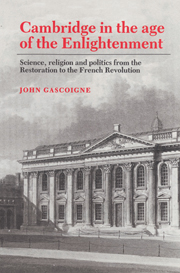 Cambridge in the Age of the Enlightenment
Cambridge in the Age of the Enlightenment Book contents
- Frontmatter
- Contents
- Acknowledgements
- Abbreviations
- Note
- Introduction
- PART ONE THE ‘HOLY ALLIANCE’ IN GESTATION, 1660–88
- PART TWO THE ‘HOLY ALLIANCE’ PROCLAIMED, 1689–1768
- PART THREE THE ‘HOLY ALLIANCE’ QUESTIONED, 1769–1800
- 7 The eclipse of whig Cambridge
- 8 The revival of revealed theology
- 9 Mathematics ascendant
- Epilogue
- Bibliography
- Index
7 - The eclipse of whig Cambridge
Published online by Cambridge University Press: 24 August 2009
- Frontmatter
- Contents
- Acknowledgements
- Abbreviations
- Note
- Introduction
- PART ONE THE ‘HOLY ALLIANCE’ IN GESTATION, 1660–88
- PART TWO THE ‘HOLY ALLIANCE’ PROCLAIMED, 1689–1768
- PART THREE THE ‘HOLY ALLIANCE’ QUESTIONED, 1769–1800
- 7 The eclipse of whig Cambridge
- 8 The revival of revealed theology
- 9 Mathematics ascendant
- Epilogue
- Bibliography
- Index
Summary
At the death of Newcastle in 1768 Cambridge could reflect on how successfully it had accommodated itself to the Hanoverian order. The disputes generated by the Glorious Revolution and the Hanoverian succession were now a distant memory and the old high church rallying-cry of ‘The Church in Danger’ was rarely heard in Cambridge common-rooms – except perhaps in that of the obstinately tory stronghold of Emmanuel. Both in its politics and its theology Cambridge had largely eschewed any claims which challenged the accepted order: the almost sacerdotal view of kingship with which the Stuarts had been associated had been effectively eliminated in a university which based its political philosophy on contract theorists such as Locke and Hoadly, while any pretensions to the independence of the clerical estate had been largely undercut by a theology which, with its emphasis on the role of individual interpretation of Scripture and unaided reason, left little room for clerical claims to a special status as custodians and interpreters of the Word.
But such comfortable conformity with the status quo was increasingly under threat after George III, the first English-born Hanoverian monarch, ascended the throne in 1760. The view of politics and theology which, together with the judicious use of patronage, had gradually reconciled Cambridge to the post-revolutionary order became less appropriate in the more troubled age which followed George III's accession.
- Type
- Chapter
- Information
- Cambridge in the Age of the EnlightenmentScience, Religion and Politics from the Restoration to the French Revolution, pp. 187 - 236Publisher: Cambridge University PressPrint publication year: 1989
- 1
- Cited by


